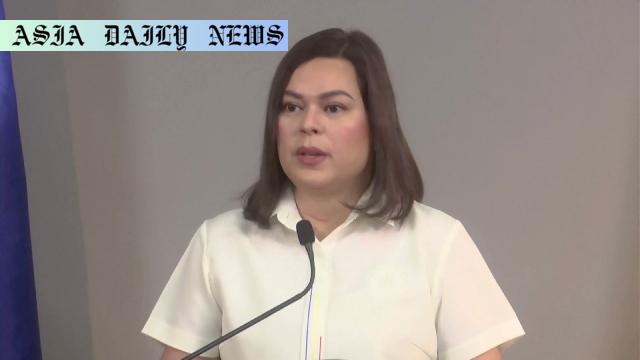Impeachment – The Philippine Senate remands Vice President Duterte’s impeachment case to ensure constitutional requirements are met.
- Impeachment complaint against VP Sara Duterte returned to the lower house.
- The Senate decision was driven by focus on constitutional adherence.
- Claims involve threats to President Marcos and fund misuse allegations.
- Conviction threatens Duterte’s 2028 presidential run eligibility.

Understanding the Impeachment Case Against Vice President Duterte
The impeachment proceedings against Philippine Vice President Sara Duterte have escalated into a significant political issue. The Senate, acting within its constitutional obligations, has returned the impeachment complaint to the House of Representatives. This decision came hours after the 23-member Senate initial convened as an impeachment court. Senate President Francis Escudero stressed that this is not a dismissal of the case but rather a step to ensure proper procedural adherence.
At the heart of these allegations is an extraordinary accusation against the Vice President, accusing her of threatening President Ferdinand Marcos Jr. and misusing public funds. Duterte, daughter of controversial former President Rodrigo Duterte, denies the allegations outright. Her impeachment was previously endorsed by the lower house in February, with controversies continuing to swirl around the timing and political motivations behind the move.
The Constitutional Perspective: Ensuring Due Process
A majority of the Senate backed the motion to remand the articles of impeachment. This step aims to ensure adherence to the constitutional protocols that govern impeachment proceedings in the Philippines. Critics, however, have expressed concerns that the move may reflect internal divisions or political maneuvering within the legislative framework. However, Senate President Escudero reiterated that the Senate would issue summons once the articles of impeachment have been adequately refiled and reviewed.
While debates about the procedural correctness persist, the overarching narrative is one of upholding constitutional law. Such efforts are critical, especially in cases as politically sensitive and consequential as this one involving the Vice President. As the country braces for its upcoming congressional session starting in July, constitutional adherence remains at the forefront of the discourse.
Implications for the Future
The unfolding trial carries significant implications for Philippine politics. If Vice President Duterte is ultimately convicted, she will lose her eligibility to run in the 2028 presidential election. This scenario would not only impact Duterte’s political trajectory but also redefine electoral dynamics in the country, where political families often hold considerable sway.
As the impeachment process plays out, questions about the timing of the allegations and their motivations remain hotly debated. The upcoming mid-term congressional election in July will see 12 new senators join the chamber, who will also act as senator-judges in this critical case. Their perspectives and political affiliations may shape the eventual outcome in unforeseen ways.
Public Reactions and Broader Impacts
Public reaction to the events has been polarized, reflecting broader divides in Philippine society. Supporters of President Marcos Jr. and critics of the Duterte family view the impeachment as an opportunity to curtail dynastic politics. In contrast, Duterte loyalists see it as a politically motivated attack aimed at discrediting one of the nation’s most prominent political figures.
This significant political development underscores the evolving nature of Philippine politics. With constitutional adherence being highlighted by the Senate and several lawmakers opposing escalated tensions, this is no longer an isolated case of intra-political rivalry but a broader test of the country’s institutions and governance framework. The months ahead will likely see continued scrutiny as the impeachment case develops further.



Commentary
An Uphill Battle for Justice or Political Drama?
The recent decision by the Philippine Senate to return Vice President Sara Duterte’s impeachment case to the lower house has fueled intense debate, both in political circles and among the general public. On the one hand, this move underscores the importance of adhering to constitutional principles, a cornerstone of any functioning democracy. On the other hand, it has raised questions about potential delays and whether these procedural concerns are being used as tools for political maneuvering.
The Stakes Are Unprecedented
Vice President Duterte’s impeachment is not just another case; it is a potential game-changer in Philippine politics. With accusations ranging from threatening the country’s president to financial misconduct, the case is deeply consequential. A conviction would bar a prominent figure from contesting the 2028 presidential election—a move that would shift the political landscape dramatically. This raises the stakes not just for Duterte but for the country’s broader political system, where such cases can set legal and political precedents.
Caution Amid Criticism
The careful approach of the Senate in remanding the impeachment case highlights the delicate balancing act that lawmakers face. While critics see this as a delay tactic, proponents argue that following due process is non-negotiable in a democracy. This duality points to the complexities of governance, where legal frameworks must coexist with political realities.
As the case unfolds, it will be crucial for both houses of Congress to maintain transparency and focus on justice. The stakes are not confined to the Vice President; they extend to the credibility and integrity of governmental institutions. For ordinary citizens, this is a reminder of the importance of active civic engagement in holding power to account.